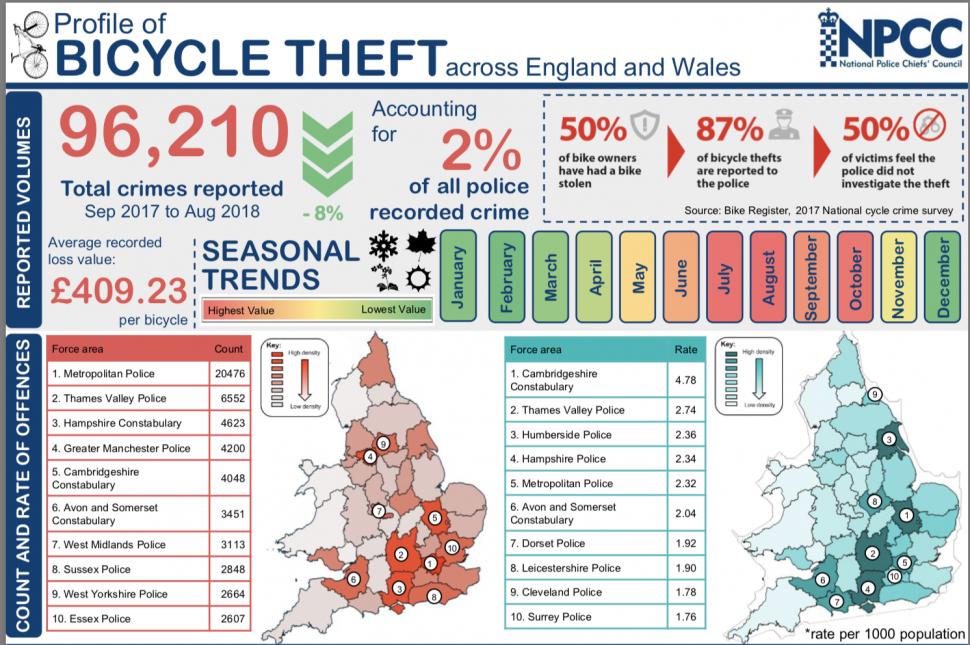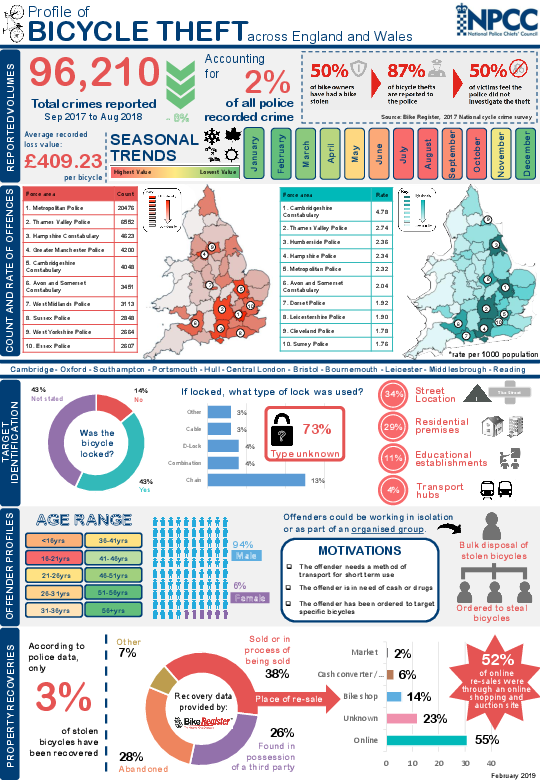- News
- Reviews
- Bikes
- Accessories
- Accessories - misc
- Computer mounts
- Bags
- Bar ends
- Bike bags & cases
- Bottle cages
- Bottles
- Cameras
- Car racks
- Child seats
- Computers
- Glasses
- GPS units
- Helmets
- Lights - front
- Lights - rear
- Lights - sets
- Locks
- Mirrors
- Mudguards
- Racks
- Pumps & CO2 inflators
- Puncture kits
- Reflectives
- Smart watches
- Stands and racks
- Trailers
- Clothing
- Components
- Bar tape & grips
- Bottom brackets
- Brake & gear cables
- Brake & STI levers
- Brake pads & spares
- Brakes
- Cassettes & freewheels
- Chains
- Chainsets & chainrings
- Derailleurs - front
- Derailleurs - rear
- Forks
- Gear levers & shifters
- Groupsets
- Handlebars & extensions
- Headsets
- Hubs
- Inner tubes
- Pedals
- Quick releases & skewers
- Saddles
- Seatposts
- Stems
- Wheels
- Tyres
- Health, fitness and nutrition
- Tools and workshop
- Miscellaneous
- Tubeless valves
- Buyers Guides
- Features
- Forum
- Recommends
- Podcast
news
 Bike theft hotspots infographic (crop)
Bike theft hotspots infographic (crop)Bike theft hotspots – police chiefs release official list for England and Wales
Police have revealed the top ten cycle theft hotspots in England and Wales, with more than 20% of the 96,210 stolen bikes recorded in a year taken from owners in London.
As part of a new report on cycle theft, the National Police Chiefs Council has released figures that break down cycle theft rates within police force areas and cities between September 2017 and August 2018.
Figures reveal the worst cities for cycle theft are Cambridge, Oxford, Southampton, Portsmouth, Hull, Central London, Bristol, Bournemouth, Leicester, Middlesbrough and Reading, with universities, city centres and transport hubs hotspots for thefts.
Superintendent Mark Cleland, National Police Lead for Cycle Theft, said he wants to "stop the scourge of cycle crime"
"One of the main blockers to people taking up cycling across the country is cycle crime, and though we have strategies to try and encourage more people to cycle and walk, we found we needed to take away that main blocker."
However, he found while police recorded crime figures showed 96,000 cycle thefts a year, the national crime survey said "something like 300,000".
"We don’t know what the true scale of the problem is because of the disparity with the crime survey of England and Wales."
Cleland is looking to improve how police tackle bike theft. In 73% of bike thefts police don’t know how the bike was locked – whether with a chain, D-lock or cable, for example.
He adds: "Standard crime reporting doesn’t reflect what’s going on. If you put your bike in the shed and a number of items is stolen including your bike, it’s classed as a burglary and it gets hidden in national figures.
Cycle theft represents 2% of all police recorded crime. Police forces with the greatest levels of cycle theft are Metropolitan Police (20,476), Thames Valley (6552), Hampshire (4623), Greater Manchester (4200), Cambridgeshire, Avon and Somerset, West Midlands, Sussex, West Yorkshire, and Essex.
Most bikes are stolen between April and October, when the highest value machines tend to be stolen, though Cleland says thefts now extend into November and December. The majority of offenders are young males aged 16-21, stealing bikes for transport, to sell for cash or drugs, or have been ordered to steal specific bikes. Most thefts occurred on the street (34%), residential premises (29%), educational establishments (11%) and transport hubs (4%).
Some bikes are broken down, resprayed and the parts sold separately, others are sold online.
There is currently no legislation around the second hand sale of bicycles, so stolen bikes are frequently and easily sold on the high street in local bicycle shops, pawn shops, and local markets, as well as online using second hand sale sites like Gumtree and eBay.
Supt Cleland says bike theft is seen by criminals as a low-risk offence, because of how difficult it is for police to prove ownership and that bikes are stolen. He says he will be sharing expertise with police forces on how to tackle thieves in hotspot areas.
"Part of the solution to this is to share best practice amongst those who want to contribute to reducing cycle crime," he says.
Although police use Bike Register, a national database of frame numbers that link bikes to owners, only around 820,000 bikes are currently registered. More than two million bikes are sold in the UK each year and Cleland would like to see bikes registered at point of sale, or when serviced at bike shops.
He wants online sellers like Gumtree, and bike shops, to work together to make cycles less attractive to thieves, and help police return stolen bikes to owners.
"If it becomes so difficult to sell a stolen bike because there’s all those checks, and police attention, it kills the market in stolen property, and that’s the angle we’re trying to get," he said.
Laura Laker is a freelance journalist with more than a decade’s experience covering cycling, walking and wheeling (and other means of transport). Beginning her career with road.cc, Laura has also written for national and specialist titles of all stripes. One part of the popular Streets Ahead podcast, she sometimes appears as a talking head on TV and radio, and in real life at conferences and festivals. She is also the author of Potholes and Pavements: a Bumpy Ride on Britain’s National Cycle Network.
Latest Comments
- wtjs 9 min 53 sec ago
Road repairs are a collection of bottomless pits- they might just as well close the active travel programme altogether instead of pretending they...
- ktache 14 min 22 sec ago
Because of the coverage of the 100 on the beeb I have started to eat pombear crisps, and indeed enjoy them, though the change from cheese and onion...
- roboito 25 min 4 sec ago
I had this on my Forerunner 955 yesterday, needed a hard reset. The instructions were on the Garmin website. A time wasting annoyance but easily...
- Rendel Harris 50 min 1 sec ago
What's the power meter they use to provide the reference figure against which they make the claims for this one? Surely the former must be the...
- Rendel Harris 51 min 52 sec ago
I dunno, they complain that they spend all this money on cycle lanes and nobody uses them and then one does and...
- TheBillder 1 hour 12 min ago
It would be very interesting to know if there's any backward compatibility with anything. If a lever breaks on my rim braked Tiagra equipped bike,...
- David9694 2 hours 44 min ago
I think he's got a screw loose. ...
- David9694 2 hours 54 min ago
Pretty much all roads in the south lead to Argos, but beware some long lead times. ...
- bensynnock 3 hours 1 min ago
I'm not sure that 800 lumens is enough for a pitch black off road trail. I switched from an 800 to an 1800 and now I can actually see where I'm...
- Hirsute 3 hours 2 min ago
From world bollards "Just drive around it. Honestly, it’s much cheaper."
 Bike theft infographic
Bike theft infographic
Add new comment
5 comments
Not wishing to downplay the annoyance of bike thefts; I'd much prefer they targeted and prosecuted dangerous drivers more.
I can buy a better lock, but can't easily choose how close someone deliberately drives near me.
In other news: yadda yadda bears in woods pope is catholic etc etc etc...
Sadly I have to agree. The shoddy attitude of people like Reading Council doesn’t help when they create a thieves mecca at the rail Station by advertising that the new “secure” bike park is covered by CCTV when it isn’t. The camera is permanently pointed the other way and of course the tea leaves know this.
Of course you only find that out when your bike has already gone - yes I’m bitter about it!
Both BTP and TVP were helpful in a “fill in the form” way, but that was it.
Love the username!
If the police were at all serious about stopping the "casual" thefts of bikes (as opposed to the targetted Strava/break-into-shed kind), then they could easily put up some CCTV and have a few honey-pot bikes that have tracking and/or DNA spray. If there's known hot-spots then it makes the thieves predictable and thus easier for the police (if they actually had the time to care about bikes).
Good luck Superintendent Mark Cleland, National Police Lead for Cycle Theft, your colleagues are all laughing at you for accepting such a dead end position. They don't give a toss, even less of a toss than dangerous driving around cyclists.
When I moved from Birmingham to Reading (a town, definitely not a city by the way) I noticed a more pervasive theft risk, and upped my security accordingly, fitted in nicely with the Kryptonite recall. At the start of the Uni year the campus was a cycle theives buffet, so many nice new bicycles, so many awful locks and those badly used.